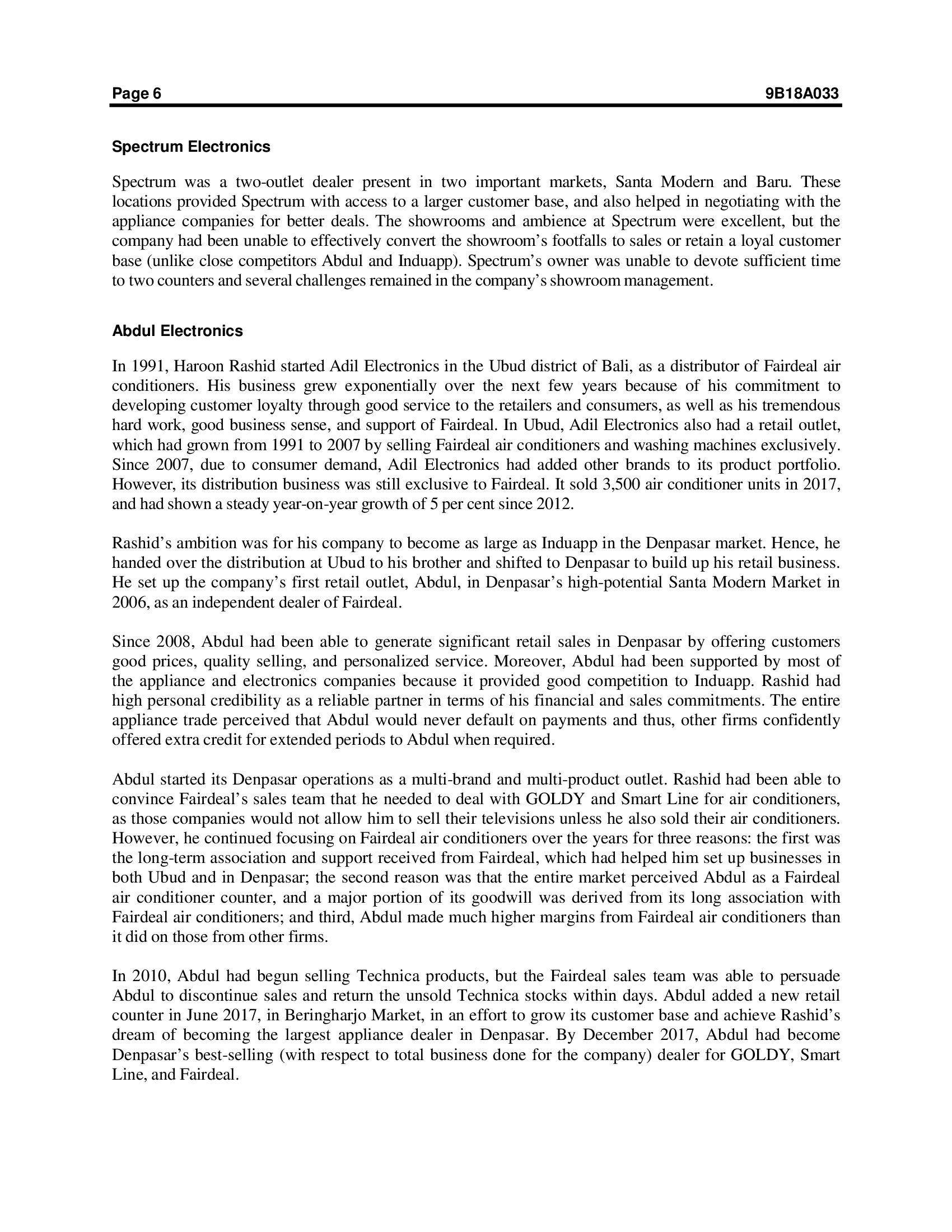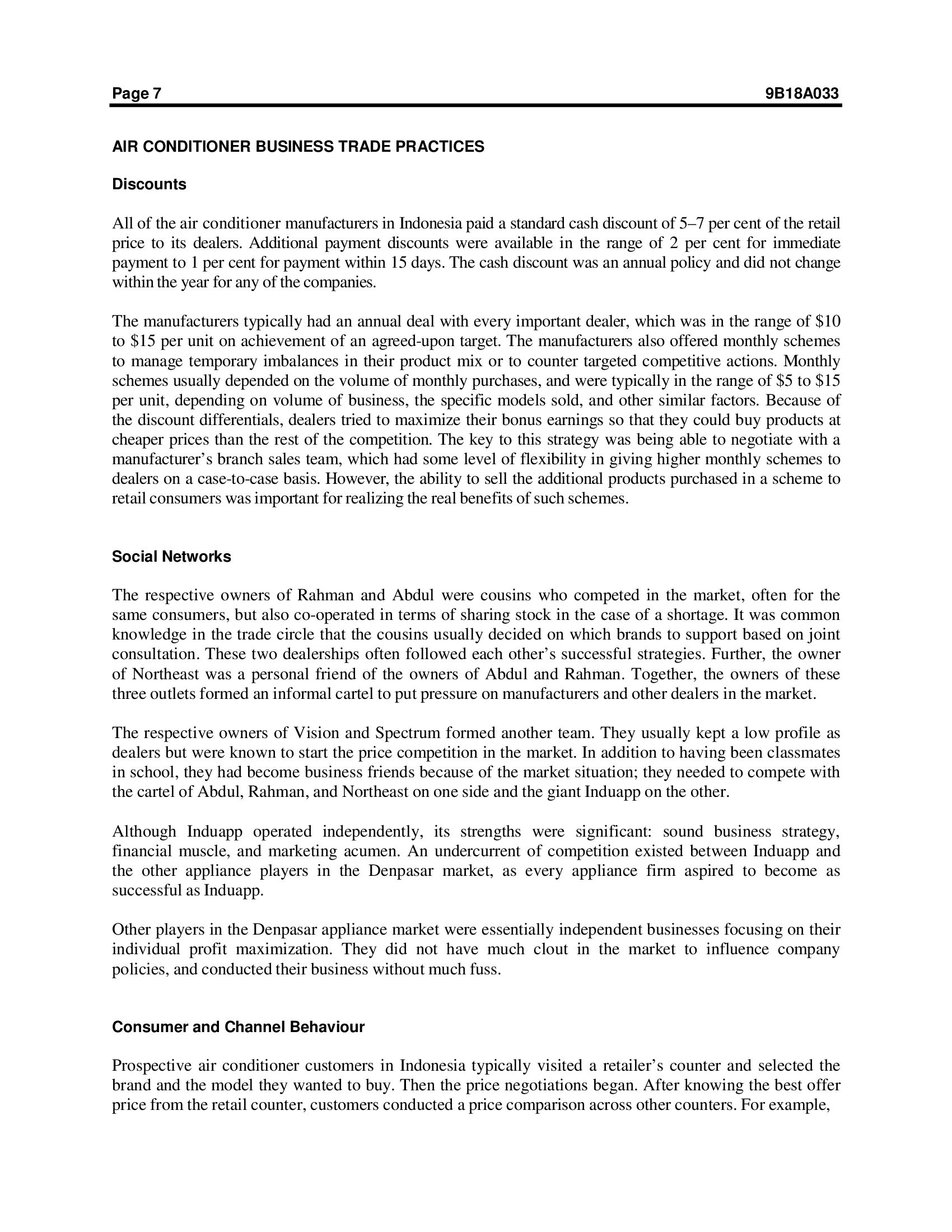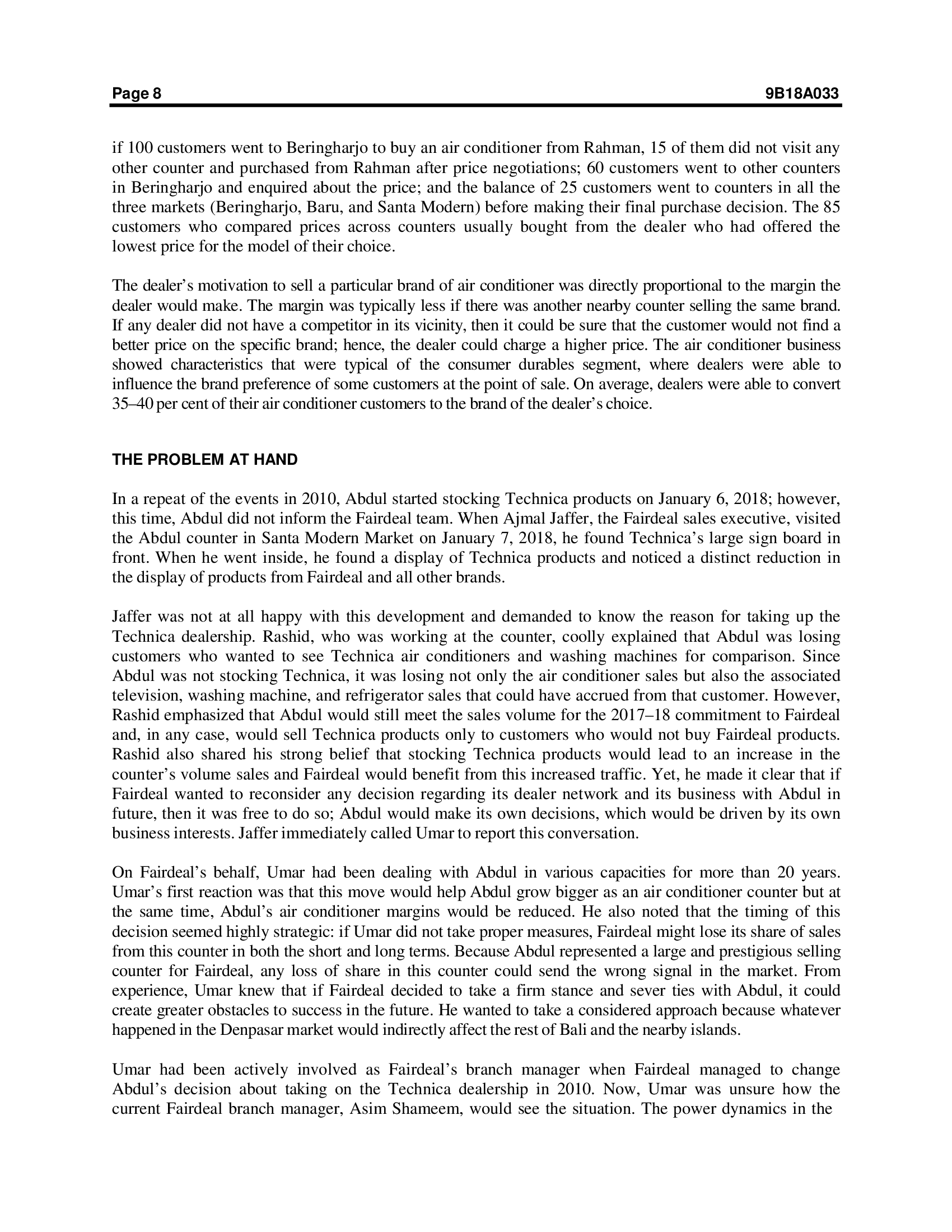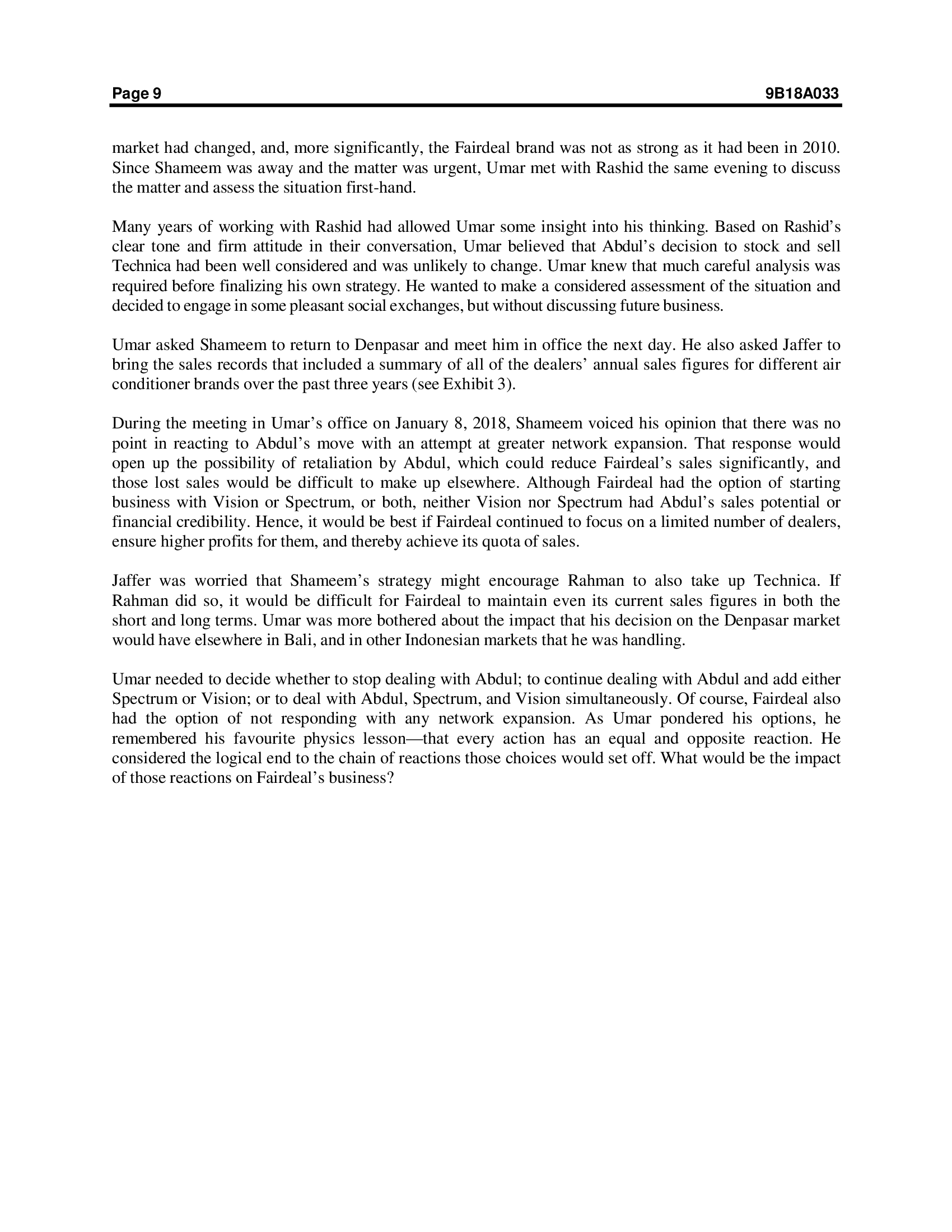What do you make of Abul's decision and its implications for Abdul's risk?
\fPage? 9B18A033 AIR CONDITIONER BUSINESS TRADE PRACTICES Discounts All of the air conditioner manufacturers in Indonesia paid a standard cash discount of 57 per cent of the retail price to its dealers. Additional payment discounts were available in the range of 2 per cent for immediate payment to 1 per cent for payment within 15 days. The cash discount was an annual policy and did not change within the year for any of the companies. The manufacturers typically had an annual deal with every important dealer, which was in the range of $10 to $15 per unit on achievement of an agreedupon target. The manufacturers also offered monthly schemes to manage temporary imbalances in their product mix or to counter targeted competitive actions. Monthly schemes usually depended on the volume of monthly purchases, and were typically in the range of $5 to $15 per unit, depending on volume of business, the specic models sold, and other similar factors. Because of the discount differentials, dealers tried to maximize their bonus earnings so that they could buy products at cheaper prices than the rest of the competition. The key to this strategy was being able to negotiate with a manufacturer's branch sales team, which had some level of exibility in giving higher monthly schemes to dealers on a case-tocase basis. However, the ability to sell the additional products purchased in a scheme to retail consumers was important for realizing the real benets of such schemes. Social Networks The respective owners of Rahman and Abdul were cousins who competed in the market, often for the same consumers, but also cooperated in terms of sharing stock in the case of a shortage. It was common knowledge in the trade circle that the cousins usually decided on which brands to support based on joint consultation. These two dealerships often followed each other's successful strategies. Further, the owner of Northeast was a personal friend of the owners of Abdul and Rahman, Together, the owners of these three outlets formed an informal cartel to put pressure on manufacturers and other dealers in the market. The respective owners of Vision and Spectrum formed another team. They usually kept a low prole as dealers but were known to start the price competition in the market. In addition to having been classmates in school, they had become business friends because of the market situation; they needed to compete with the cartel of Abdul, Rahman, and Northeast on one side and the giant Induapp on the other. Although Induapp operated independently, its strengths were signicant: sound business strategy, nancial muscle, and marketing acumen. An undercurrent of competition existed between Induapp and the other appliance players in the Denpasar market, as every appliance rm aspired to become as successful as Induapp. Other players in the Denpasar appliance market were essentially independent businesses focusing on their individual prot maximization. They did not have much clout in the market to influence company policies, and conducted their business without much fuss. Consumer and Channel Behaviour Prospective air conditioner customers in Indonesia typically visited a retailer's counter and selected the brand and the model they wanted to buy. Then the price negotiations began. After knowing the best offer price from the retail counter, customers conducted a price comparison across other counters. For example, Page 8 9B1 8AO33 if 100 customers went to Beringharjo to buy an air conditioner from Rahman, 15 of them did not visit any other counter and purchased from Rahman after price negotiations; 60 customers went to other counters in Beringharjo and enquired about the price; and the balance of 25 customers went to counters in all the three markets (Beringharj 0, Barn, and Santa Modern) before making their nal purchase decision. The 85 customers who compared prices across counters usually bought from the dealer who had offered the lowest price for the model of their choice. The dealer's motivation to sell a particular brand of air conditioner was directly proportional to the margin the dealer would make. The margin was typically less if there was another nearby counter selling the same brand. If any dealer did not have a competitor in its vicinity, then it could be sure that the customer would not nd a better price on the specic brand; hence, the dealer could charge a higher price. The air conditioner business showed characteristics that were typical of the consumer durables segment, where dealers were able to inuence the brand preference of some customers at the point of sale. On average, dealers were able to convert 3540 per cent of their air conditioner customers to the brand of the dealer's choice. THE PROBLEM AT HAND In a repeat of the events in 2010, Abdul started stocking Technica products on January 6, 2018; however, this time, Abdul did not inform the Fairdeal team. When Ajmal J affer, the Fairdeal sales executive, visited the Abdul counter in Santa Modern Market on January 7, 2018, he found Technica's large sign board in front. When he went inside, he found a display of Technica products and noticed a distinct reduction in the display of products from Fairdeal and all other brands. J affer was not at all happy with this development and demanded to know the reason for taking up the Technica dealership. Rashid, who was working at the counter, coolly explained that Abdul was losing customers who wanted to see Technica air conditioners and washing machines for comparison. Since Abdul was not stocking Technica, it was losing not only the air conditioner sales but also the associated television, washing machine, and refrigerator sales that could have accrued from that customer. However, Rashid emphasized that Abdul would still meet the sales volume for the 201718 commitment to Fairdeal and, in any case, would sell Technica products only to customers who would not buy Fairdeal products. Rashid also shared his strong belief that stocking Technica products would lead to an increase in the counter's volume sales and Fairdeal would benet from this increased traffic. Yet, he made it clear that if Fairdeal wanted to reconsider any decision regarding its dealer network and its business with Abdul in future, then it was free to do so; Abdul would make its own decisions, which would be driven by its own business interests. Jaffer immediately called Umar to report this conversation. On Fairdeal's behalf, Umar had been dealing with Abdul in various capacities for more than 20 years. Umar's rst reaction was that this move would help Abdul grow bigger as an air conditioner counter but at the same time, Abdul's air conditioner margins would be reduced. He also noted that the timing of this decision seemed highly strategic: if Umar did not take proper measures, Fairdeal might lose its share of sales from this counter in both the short and long terms. Because Abdul represented a large and prestigious selling counter for Fairdeal, any loss of share in this counter could send the wrong signal in the market. From experience, Umar knew that if Fairdeal decided to take a rm stance and sever ties with Abdul, it could create greater obstacles to success in the future. He wanted to take a considered approach because whatever happened in the Denpasar market would indirectly affect the rest of Bali and the nearby islands. Umar had been actively involved as Fairdeal's branch manager when Fairdeal managed to change Abdul's decision about taking on the Technica dealership in 2010. Now, Umar was unsure how the current Fairdeal branch manager, Asim Shameem, would see the situation. The power dynamics in the Page 9 9B1 8AO33 market had changed, and, more signicantly, the Fairdeal brand was not as strong as it had been in 2010. Since Shameem was away and the matter was urgent, Umar met with Rashid the same evening to discuss the matter and assess the situation rst-hand. Many years of working with Rashid had allowed Umar some insight into his thinking. Based on Rashid's clear tone and rm attitude in their conversation, Umar believed that Abdul's decision to stock and sell Technica had been well considered and was unlikely to change. Umar knew that much careful analysis was required before nalizing his own strategy. He wanted to make a considered assessment of the situation and decided to engage in some pleasant social exchanges, but without discussng future business. Umar asked Shameem to return to Denpasar and meet him in ofce the next day. He also asked Jaffer to bring the sales records that included a summary of all of the dealers' annual sales gures for different air conditioner brands over the past three years (see Exhibit 3). During the meeting in Umar's ofce on January 8, 2018, Shameem voiced his opinion that there was no point in reacting to Abdul's move with an attempt at greater network expansion. That response would open up the possibility of retaliation by Abdul, which could reduce Fairdeal's sales significantly, and those lost sales would be difficult to make up elsewhere. Although Fairdeal had the option of starting business with Vision or Spectrum, or both, neither Vision nor Spectrum had Abdul's sales potential or nancial credibility. Hence, it would be best if Fairdeal continued to focus on a limited number of dealers, ensure higher prots for them, and thereby achieve its quota of sales. Jaffer was worried that Shameem's strategy might encourage Rahman to also take up Technica. If Rahman did so, it would be difcult for Fairdeal to maintain even its current sales gures in both the short and long terms. Umar was more bothered about the impact that his decision on the Denpasar market would have elsewhere in Bali, and in other Indonesian markets that he was handling. Umar needed to decide whether to stop dealing with Abdul; to continue dealing with Abdul and add either Spectrum or Vision; or to deal with Abdul, Spectrum, and Vision simultaneously. Of course, Fairdeal also had the option of not responding with any network expansion. As Umar pondered his options, he remembered his favourite physics lessonthat every action has an equal and opposite reaction. He considered the logical end to the chain of reactions those choices would set off. What would be the impact of those reactions on Fairdeal's business










